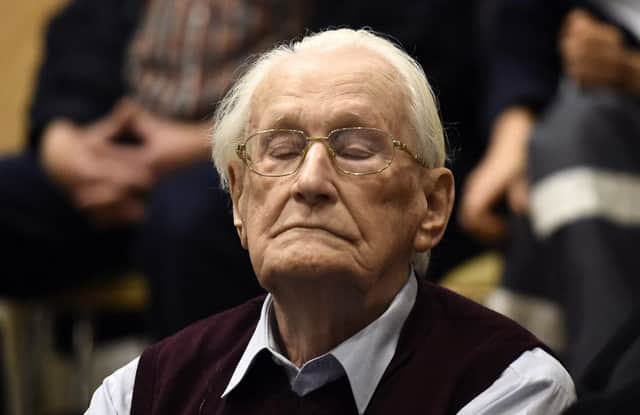Leaders: Auschwitz trial is necessary and justified


Oskar Groening did not facilitate genocide. He had no direct involvement in the horrific mass murders that took place. So how can such a punishment, at such an age, and more than seventy years after these horrific events, make any sense?
But the central issue in this case is as resonant now as it was when Auschwitz was in its ghastly operation. And it will continue to resonate for future generations. It is whether people who play a minor role in crimes against humanity but had not actively killed anyone could still be guilty of a crime.
Advertisement
Hide AdAdvertisement
Hide AdThe evil of Auschwitz was made possible, not only by those in the front line of mass murder, but by the compliance of hundreds of guards, train drivers, administrators and book-keepers. The passing of the years, and Groening’s physical distance from the gas chambers, makes no difference to this key point. A lawyer for a group of plaintiffs argued that the case demonstrated that Auschwitz as a whole was “a murder machinery… everyone who participated in it has to take responsibility for it”.
And delivering the verdict, Judge Franz Kompisch agreed. He said Groening had willingly taken a “safe desk job” in a system that was “inhumane and all but unbearable for the human psyche”.
More than one million people, most of them European Jews, died between 1940 and 1945 in the Auschwitz-Birkenau camp. Ever since the horrors of Auschwitz and other Nazi death camps were exposed, the world has wondered – and continues to wonder – at how such atrocities could have been committed. Perhaps the most chilling aspect of all for a world that recoils in horror at what was undertaken in the death camps is that the events are still within living memory. Indeed, the trial in the northern German city of Lueneburg heard evidence from several people who had survived the death camp. And the children of survivors spoke of their trauma in absorbing their parents’ revelations of horror, of how innocent children could be murdered and whole families and communities eradicated.
While some of the survivors have been capable of forgiveness, a statement from a group of Holocaust survivors and victims’ relatives said the pain of losing families at Auschwitz could not be alleviated by criminal proceedings or the words of the accused.
It is not enough of a defence to argue that the accused did not personally pull the trigger. The core lesson for all if we are to avoid a repetition is the enduring wisdom of Edmund Burke: “The only thing necessary for the triumph of evil is for good men to do nothing.”
Homecoming was Year of the Day Out
The Year of Homecoming 2014 was the government’s tourist flagship event last year. Every opportunity was taken by government ministers and VisitScotland to bang the drum. But in the event it turned out to be more of a Year of the Day Out for indigenous Scots, with only nine per cent of visitors coming from overseas.
The vast majority of people who attended events already lived in Scotland while most people who spent money on staying overnight were event staff, according to a study commissioned by VisitScotland. Such events have not had a happy history.
The Homecoming attracted just 400,000 overseas visitors, and while VisitScotland claims the total of more than a thousand events generated £136 million of additional revenue to the economy and £94 million of “net additional spending” by visitors, such figures are difficult to compile and confirm with accuracy.
Advertisement
Hide AdAdvertisement
Hide AdThe project was aimed at motivating ancestral Scots, the people of Scotland and “all those with an affinity to Scotland”, to visit the country. Future promotions might now achieve superior results by focusing not just on those with an ancestral connection to Scotland but on the country’s global appeal: its magnificent scenery, and the history and heritage of Scotland’s cities, the national capital in particular.
Attracting tourists world-wide is now of paramount importance given the sharp increase in numbers from the Asia-Pacific region who have had no previous connection with Scotland, ancestral or otherwise.